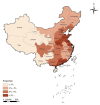Acceptance of COVID-19 Vaccination during the COVID-19 Pandemic in China
- PMID: 32867224
- PMCID: PMC7565574
- DOI: 10.3390/vaccines8030482
Acceptance of COVID-19 Vaccination during the COVID-19 Pandemic in China
Abstract
Background: Faced with the coronavirus disease 2019 (COVID-19) pandemic, the development of COVID-19 vaccines has been progressing at an unprecedented rate. This study aimed to evaluate the acceptance of COVID-19 vaccination in China and give suggestions for vaccination strategies and immunization programs accordingly.
Methods: In March 2020, an anonymous cross-sectional survey was conducted online among Chinese adults. The questionnaire collected socio-demographic characteristics, risk perception, the impact of COVID-19, attitudes, acceptance and attribute preferences of vaccines against COVID-19 during the pandemic. Multivariate logistic regression was performed to identify the influencing factors of vaccination acceptance.
Results: Of the 2058 participants surveyed, 1879 (91.3%) stated that they would accept COVID-19 vaccination after the vaccine becomes available, among whom 980 (52.2%) wanted to get vaccinated as soon as possible, while others (47.8%) would delay the vaccination until the vaccine's safety was confirmed. Participants preferred a routine immunization schedule (49.4%) to emergency vaccination (9.0%) or either of them (41.6%). Logistic regression showed that being male, being married, perceiving a high risk of infection, being vaccinated against influenza in the past season, believing in the efficacy of COVID-19 vaccination or valuing doctor's recommendations could increase the probability of accepting COVID-19 vaccination as soon as possible, while having confirmed or suspected cases in local areas, valuing vaccination convenience or vaccine price in decision-making could hinder participants from immediate vaccination.
Conclusion: During the pandemic period, a strong demand for and high acceptance of COVID-19 vaccination has been shown among the Chinese population, while concerns about vaccine safety may hinder the promotion of vaccine uptake. To expand vaccination coverage, immunization programs should be designed to remove barriers in terms of vaccine price and vaccination convenience, and health education and communication from authoritative sources are important ways to alleviate public concerns about vaccine safety.
Keywords: COVID-19; SARS-CoV-2; immunization; vaccine acceptance; vaccine preference.
Conflict of interest statement
The authors declare no conflict of interest.
Figures
Similar articles
-
The Changing Acceptance of COVID-19 Vaccination in Different Epidemic Phases in China: A Longitudinal Study.Vaccines (Basel). 2021 Feb 25;9(3):191. doi: 10.3390/vaccines9030191. Vaccines (Basel). 2021. PMID: 33668923 Free PMC article.
-
The attitudes of psychiatric patients towards COVID-19 vaccination in China: a cross-sectional study.BMC Psychiatry. 2021 Sep 29;21(1):475. doi: 10.1186/s12888-021-03484-9. BMC Psychiatry. 2021. PMID: 34587935 Free PMC article.
-
Knowledge, beliefs, attitudes and perceived risk about COVID-19 vaccine and determinants of COVID-19 vaccine acceptance in Bangladesh.PLoS One. 2021 Sep 9;16(9):e0257096. doi: 10.1371/journal.pone.0257096. eCollection 2021. PLoS One. 2021. PMID: 34499673 Free PMC article.
-
Intention to Vaccinate against COVID-19 in Adolescents: A Systematic Review.Vaccines (Basel). 2023 Aug 21;11(8):1393. doi: 10.3390/vaccines11081393. Vaccines (Basel). 2023. PMID: 37631961 Free PMC article. Review.
-
The 2009-2010 influenza pandemic: effects on pandemic and seasonal vaccine uptake and lessons learned for seasonal vaccination campaigns.Vaccine. 2010 Sep 7;28 Suppl 4:D3-13. doi: 10.1016/j.vaccine.2010.08.024. Vaccine. 2010. PMID: 20713258 Review.
Cited by
-
Hesitation towards COVID-19 booster vaccination among dialysis patients: a cross-sectional study in Taizhou, China.BMC Infect Dis. 2024 Oct 2;24(1):1095. doi: 10.1186/s12879-024-09917-6. BMC Infect Dis. 2024. PMID: 39358705 Free PMC article.
-
Attitudes of Lebanese adults regarding COVID-19 vaccination.BMC Public Health. 2021 May 27;21(1):998. doi: 10.1186/s12889-021-10902-w. BMC Public Health. 2021. PMID: 34044790 Free PMC article.
-
A Mixed-Methods Study of COVID-19 Vaccine Acceptance and Its Determinants Among Pregnant Women in Northeast Ethiopia.Patient Prefer Adherence. 2022 Aug 23;16:2287-2299. doi: 10.2147/PPA.S374217. eCollection 2022. Patient Prefer Adherence. 2022. PMID: 36039366 Free PMC article.
-
Knowledge, attitudes, and practices toward COVID-19: A cross-sectional study during normal management of the epidemic in China.Front Public Health. 2022 Sep 8;10:913478. doi: 10.3389/fpubh.2022.913478. eCollection 2022. Front Public Health. 2022. PMID: 36159311 Free PMC article.
-
Exploring the Willingness to Accept SARS-CoV-2 Vaccine in a University Population in Southern Italy, September to November 2020.Vaccines (Basel). 2021 Mar 18;9(3):275. doi: 10.3390/vaccines9030275. Vaccines (Basel). 2021. PMID: 33803730 Free PMC article.
References
-
- World Health Organization WHO Coronavirus Disease (COVID-19) Dashboard. [(accessed on 17 July 2020)]; Available online: https://covid19.who.int/?gclid=EAIaIQobChMI2_CM6eDZ6gIVghh9Ch3nDQm1EAAYA....
-
- World Health Organization WHO Director-General’s Opening Remarks at the Media Briefing on COVID-19—11 March. [(accessed on 13 April 2020)]; Available online: https://www.who.int/dg/speeches/detail/who-director-general-s-opening-re....
Grants and funding
LinkOut - more resources
Full Text Sources
Miscellaneous


